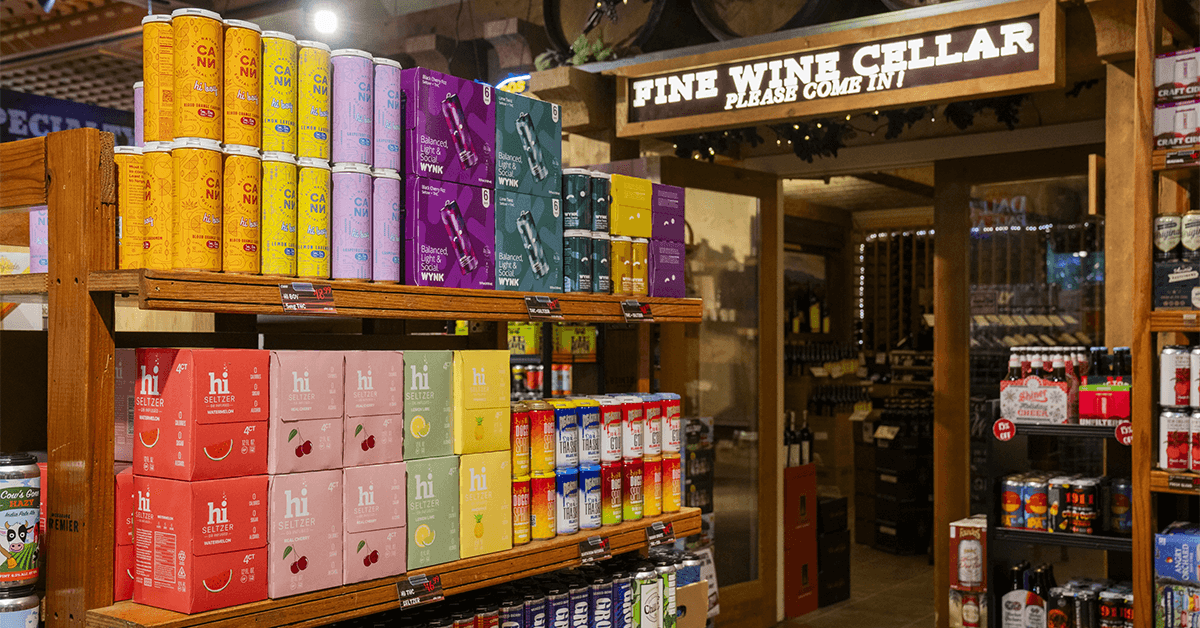Dr. Greenthumb's Expands to Detroit with Grand Opening Event

Dr. Greenthumb's, founded by renowned hip hop artist and cannabis advocate B Real of Cypress Hill, is celebrating the grand opening of its newest location in Detroit. The event will take place on May 24th, from 10 am to 6 pm, at the new retail store located at 6220 8 Mile Rd.
The grand opening will feature a day packed with exciting activities and special offers. Attendees can expect a variety of vendors showcasing the latest cannabis products, creating a unique and engaging experience for all visitors.
In appreciation of the warm welcome from the Detroit community, Dr. Greenthumb's is offering a 30% discount on all store items (excluding deli flower) throughout the day. This presents an excellent opportunity for both seasoned cannabis enthusiasts and newcomers to purchase their favorite products at remarkable prices.
Additionally, there will be giveaways throughout the event, giving attendees the chance to win prizes and exclusive merchandise. The first 50 customers to spend $100 will receive an exclusive goody bag, so early arrival is encouraged.
Detroit holds significant importance in B Real's career, both in music and cannabis. Given his long-standing connection with the city, B Real chose Detroit as the location for his first Dr. Greenthumb's store outside of California.
"Moving into a new state isn't easy," said B Real. "Focusing on markets that have close ties to Cypress Hill is one of the main reasons I decided to bring Dr. Greenthumb's to Detroit. This city is synonymous with some of the most famous musicians and music artists in the world. Cypress Hill is part of that legacy so it only made sense that Detroit would be home to the first Dr. Greenthumb's retailer outside of California."
The grand opening on May 24th promises to be a day filled with fun, food, and fantastic deals at Dr. Greenthumb's new Detroit location.
ReLeaf Center Joins Dowagiac Community with Symbolic Ribbon Tying

On Wednesday, the ReLeaf Center officially joined the Dowagiac business community with a unique ribbon tying ceremony. This event, held at 29402 Amerihost Dr, brought together Chamber of Commerce representatives and local business owners to celebrate the occasion. The ribbon tying, in contrast to the traditional ribbon-cutting, symbolized the unity between the business and the community.
The ReLeaf Center, which also operates a facility in Niles at 1840 Terminal Rd., is involved in the cultivation, processing, and provisioning of cannabis. While the company has several locations in eastern Michigan, the Niles site was the first to grow cannabis plants, which are then processed and distributed to other ReLeaf locations. The Dowagiac center marks the second provisioning site in the city.
"We help a lot of people and it's just great to see," said General Manager Lisa Frank. "I'm so very happy to be part of all this. It's just been a great experience for me." The ReLeaf Center operates from 9 a.m. to 8 p.m. Monday through Wednesday, 9 a.m. to 9 p.m. Thursday through Saturday, and 9 a.m. to 4 p.m. on Sunday. It also offers a drive-thru service.
Owner Michael E. Gelatke expressed his enthusiasm for the new location, stating, "It means a lot. The cooperation with the city has been great. We've built these in other places and the cooperation isn't always very good, but this town has been great. We're happy to be here."
Jeeter and Marley Family Launch Limited Edition "One Love" Unity Joint

Jeeter has partnered with the Bob Marley family company to pay tribute to Marley's musical legacy and his passion for cannabis. On May 23rd, cannabis consumers in Arizona, California, and Michigan will have the chance to purchase the limited edition Jeeter x Bob Marley "One Love" Unity Joint.
Jeeter collaborated closely with the Marley family, immersing themselves in Jamaican culture and supporting a music festival at Bob Marley's birthplace, Nine Mile. This deep engagement ensured that every element of the product, from the strain to the packaging, authentically reflects Bob Marley's legacy. The packaging honors his musical contributions, while the strain is inspired by Marley's affectionate term for cannabis, "herb." A ceramic tip, reminiscent of the joints Marley preferred, adds an extra layer of authenticity.
"Jeeter's work in the cannabis space has been outstanding. Cannabis culture and the Marley movement are deeply intertwined. Jeeter's dedication to understanding and embracing Jamaican culture has been wonderful to see, and the results are truly impressive," said Cedella Marley, CEO of the Bob Marley Group of Companies, Grammy-winning singer, author, and Marley's daughter.
The unique joint is housed in a signature guitar case, reimagined through Jeeter's artistic branding. The leather case features a gold embossing of Marley's image and opens to reveal a classic double-twisted hand-rolled joint, akin to those Marley was known for. The "One Love" joint contains 4.2 grams of premium cannabis flower, rolled into a ceramic tip.
"We're thrilled to collaborate with the iconic music legend Bob Marley. To ensure the collaboration was genuine, we traveled to Jamaica to connect with the culture he loved. This project is all about celebrating Marley's legacy in an authentic and respectful way," stated Jeeter Co-Founders Lukasz Tracz and Sebastian Solano.
On April 20th, Jeeter hosted its second annual High Dining event in Los Angeles with long-time partner Dwyane Wade. The event, celebrating cannabis enthusiasts and friends, showcased Jeeter's commitment to creating live experiences that blend culture, creativity, and music. Guests enjoyed a special performance by Marley's grandson, Skip Marley, who covered classics like "Buffalo Soldier" and concluded with "One Love." Attendees were gifted the unique Jeeter x Marley "One Love" collector's edition.
Breweries Exploit Legal Loophole to Create THC-Infused Beverages

Cycling Frog and Delta Light are among the brands offering euphoric and relaxing effects through their canned beverages infused with THC, the main psychoactive ingredient of the cannabis plant. These drinks, which are non-alcoholic but capable of inducing a high, are increasingly distributed by alcohol companies from Connecticut to Texas to offset declining alcohol sales.
Unlike federally restricted cannabis products, these THC drinks are legal in many states because they are made with THC derived from hemp. Hemp, a form of the cannabis plant containing less than 0.3% THC, was legalized under the 2018 Farm Bill, which primarily intended to promote hemp for industrial uses. However, beverage makers have exploited this loophole to create psychoactive hemp concentrates.
Charlotte, North Carolina-based Drink Delta offers six varieties of hemp-derived THC drinks and describes the market opportunity as "like finding a loophole in the Matrix." This burgeoning market has attracted traditional alcohol distributors who are lobbying to maintain this legal loophole. This puts them at odds with lawmakers and established cannabis companies, which face strict regulations.
Unlike marijuana-derived THC products, hemp-derived THC products can be shipped interstate, utilize large national banks, accept credit cards, and benefit from tax deductions. Cannabis companies, which sell products like raw flower, edibles, pre-rolled joints, and tinctures, are restricted from these advantages because marijuana remains illegal at the federal level.
While 24 states allow recreational use of marijuana-derived THC, it remains federally illegal, awaiting reclassification. The Justice Department has initiated steps to reclassify marijuana as a less dangerous drug.
Regulators express concerns that poorly labeled hemp-derived drinks could expose consumers, especially children, to unexpected intoxication or unknown toxins. Currently, distributors of these beverages do not require special licenses, allowing them to display these products alongside traditional alcoholic beverages.
Some states are taking action to regulate these drinks. New York has banned drinks with more than 1 milligram of THC per serving since last summer, and Connecticut recently advanced similar legislation. Attorneys general from 20 states and Washington, D.C., are lobbying for explicit federal guidelines allowing states to ban high-potency products.
Joe Grabowski of Sarene Craft Beer Distributors LLC testified against Connecticut's proposed restrictions, arguing that such laws would harm his business, which has seen growth due to hemp-derived products amid declining alcohol sales. He suggested age restrictions, safety testing, and new taxes as better alternatives.
Minnesota serves as a model for regulated hemp-derived THC products, requiring businesses to register with the state and restricting sales to those 21 and older. The state, which only recently legalized recreational marijuana, sees significant demand for hemp-derived products, generating annual sales of about $180 million.
Even established cannabis companies are entering the hemp-derived THC market. Curaleaf Holdings Inc. announced plans to add these drinks to its product lineup, citing them as a "long-term growth driver."
The cooperation between alcohol distributors and the hemp industry is accelerating the availability of these products. In Texas, Bayou City Hemp Co. expanded its reach to over 1,000 stores through a deal with Silver Eagle Houston, a distributor for Anheuser-Busch InBev NV.
However, the U.S. Cannabis Council (USCC) warns against the unregulated market for hemp-derived drinks. In a letter to Congress, USCC Executive Director Edward Conklin cautioned that the lack of regulation could lead to a "Prohibition-era" crisis. The USCC advocates for hemp-derived THC to be regulated similarly to marijuana.
Despite regulatory uncertainties, the support from the alcohol industry is driving confidence in the legal status of hemp beverages. Farmers are preparing for increased demand, with projections showing a significant increase in hemp acreage dedicated to consumption.
"Once alcohol starts getting involved and starts pushing their lobbying dollars against the other side, there's no way you beat that," said Drink Delta's CEO Jack Sherrie.
Ann Arbor Dedicates Cannabis Tax Revenue to Social Services in New Budget

On May 20th, the Ann Arbor City Council unanimously adopted a new city budget, designating $1 million from annual cannabis tax revenue for social services aimed at marginalized communities.
The allocation includes $500,000 to support the Rising Hope for Housing program, an increase from the previous year's $400,000. This program aids individuals disproportionately affected by the criminal justice system and the war on drugs, focusing on people of color and low-income residents. Services offered include mental health counseling, housing advocacy, and job training, all aimed at preventing homelessness and reducing recidivism.
"The Rising Hope for Housing program is transforming lives by offering essential, trauma-informed services like mental health counseling, housing advocacy, and job training," said Council Member Cynthia Harrison, D-1st Ward.
Additionally, the council allocated $250,000 for eviction-prevention efforts and another $250,000 for services targeting low-income youth. This year, Ann Arbor's share of Michigan's cannabis tax revenue amounted to over $1.5 million, with City Administrator Milton Dohoney setting aside $1 million for the council to allocate. The remaining funds will support various initiatives, including partnerships with the Shelter Association of Washtenaw County and Michigan Medicine, as well as community programming in a new affordable housing project on Catherine Street.
The adopted budget for the 2024-25 fiscal year, starting July 1st, includes $607 million in revenue and $564 million in spending across all funds. This budget necessitates a $2.8 million draw from cash reserves to balance the general fund, where expenses are projected to rise by $9.5 million, or 7.6%, to over $140 million. The increased costs include expanding the city's workforce from 829 to 849 full-time-equivalent positions, with new roles in parks, planning, and building departments.
Two new positions prioritized by city leaders—a director and a coordinator for a new economic development office—are included in the budget. However, council members were divided on a proposal to allocate an additional $100,000 from cash reserves for printed communications to constituents, which passed despite some opposition.
A separate proposal by Council Members Travis Radina and Ayesha Ghazi Edwin to prioritize $250,000 for crosswalk upgrades on Stone School Road was rejected. Council Member Erica Briggs, D-5th Ward, emphasized the widespread need for such improvements citywide, while Radina expressed pride in the overall budget, highlighting its commitment to community values, including sustainability and pedestrian safety.
Briggs and other council members anticipate that new investments in economic development will generate additional tax revenue in the coming years. Council Member Jen Eyer, D-4th Ward, highlighted the importance of the new economic development office for addressing the city's housing crisis.
City officials are also planning significant changes to zoning and land-use policies, necessitating $100,000 for external planning consultants. Eyer stressed the urgency of these changes to support housing growth.
"This is a balanced budget that accomplishes what our community demands — to improve basic services and enhance quality of life," said Mayor Christopher Taylor. "It does so with momentum, vision, and practicality."
Cannabis Tech Merger Falls Through as Agrify and Nature's Miracle Halt Plans

The anticipated merger between cannabis technology provider Agrify Corp. (NASDAQ: AGFY) and controlled-environment agricultural technology firm Nature's Miracle (NASDAQ: NMHI) has been called off due to "unfavorable market conditions," according to announcements made by both companies on Monday.
Stock Market Reactions
Following the news, Agrify Corp. (AGFY) saw its shares plummet nearly 15% on the Nasdaq exchange, dropping from 33 cents per share at the opening to 28 cents by midday. Similarly, shares of Nature's Miracle (NMHI) fell more than 20%, decreasing from 74 cents in the morning to just under 54 cents by midday trading.
Details of the Merger
The merger, initially announced in April, aimed to consolidate Agrify and Nature's Miracle in a significant deal that valued the equity of publicly traded Agrify at $6.3 million. Under the terms, Nature's Miracle was to purchase $750,000 worth of LED lighting equipment from Agrify and assume its debt, owned by businesses controlled by Agrify CEO Raymond Chang, for an unspecified amount of cash and stock.
Additionally, Raymond Chang was slated to become president of a new Agrify division within Nature's Miracle and secure a seat on the combined company's board. Nature's Miracle planned to issue 0.45 common shares to Agrify shareholders for each Agrify share held, aiming to close the transaction in the latter half of 2024. Post-merger, Agrify shareholders were expected to own approximately 30% of the combined company's common stock, which would focus on indoor vertical farming and cannabis extraction.
Agrify's Financial Struggles
The cancellation of the merger follows Agrify's troubling financial disclosures. The company reported an annual net loss of $18.7 million in its earnings call and expressed "substantial doubt" about its ability to continue as a going concern in its annual 10-K report. Despite these financial challenges, Agrify CEO Raymond Chang highlighted the company's strong momentum and growth in both cultivation and extraction business divisions.
Official Statements and Future Plans
In the announcement regarding the terminated merger, Raymond Chang stated, "Agrify continues to see strong momentum and pipeline growth quarter after quarter in both cultivation and extraction business divisions. We believe that it is in Agrify's best interest to stay the course and continue to execute." Chang emphasized that Agrify's management team and board are committed to exploring all strategic options to maximize shareholder value.
James Li, CEO of Nature's Miracle, echoed similar sentiments in their press release, stating, "Based on the current unfavorable market conditions, we've determined this is in the best interest of our shareholders and the long-term value of our business. At Nature's Miracle, we will continue to focus on our core indoor growing products, including grow light, dehumidifier, and container growing systems, where we are seeing strong momentum. We extend our appreciation to the Agrify team for their cooperation."
The abrupt decision to cancel the merger highlights the volatility and challenges within the cannabis industry, particularly amid uncertain market conditions. Both companies appear poised to continue their independent operations with a focus on their core competencies and market strategies.
For those interested in the financial side of the cannabis industry, an exclusive opportunity awaits. By signing up through our Robinhood referral link, you might secure a free portion of Agrify stock, making you a part of the groundbreaking journey of companies like Agrify in the cannabis sector. Explore this chance and potentially start your investment journey in the burgeoning cannabis market.


 Helpful Links
Helpful Links